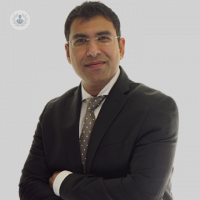Refractive lens exchange surgery: your questions answered
Written in association with:Refractive lens exchange surgery is a procedure that is similar to cataract surgery, with a number of key differences. In his latest online article, renowned consultant ophthalmic surgeon Mr Prateek Agarwal explains this procedure in detail.

What is refractive lens exchange surgery? What does it involve?
A refractive lens exchange surgery is a premium refractive procedure wherein the natural lens which has early/minimal cataractous changes is replaced by an artificial lens. This lens can be a Toric/Multifocal/EDOF lens, thereby reducing the dependency on glasses completely or significantly, unlike the standard lenses used in cataract surgery.
How does it compare to cataract surgery/other procedures of this type?
Normal cataract surgery involves the implantation of a standard mono-focal lens. In contrast, refractive lens exchange involves dedicated calculations, using cornea topography, modern formulas, more sophisticated pre-operative testing to measure the eye’s optics, and more sophisticated lens implants such as multifocal and Toric lens implants. It is aimed at addressing the astigmatism and arriving at the best possible scenario to reduce dependency on glasses for both distance and near.
Who is a good candidate for refractive lens exchange treatment?
Usually, patients in their mid-50s to any age are good candidates for this procedure.
What are the success rates of refractive lens exchange? Is it safe?
A refractive lens exchange is very much similar to cataract surgery except that more sophisticated pre-operative testing to measure the eye’s optics, and more sophisticated lens implants such as multifocal and toric lens implants are involved. The success rates, risks and complications are similar to cataract surgery, of which thousands are performed every week in the UK.
How long do the results last?
The results are expected to last a lifetime unless some other pathologies in other components of the eye develop as a part of the normal ageing process. As an example, age-related macular degeneration /glaucoma/diabetic retinopathy may occur independently, but not due to the surgery procedure itself.
Mr Prateek Agarwal is a highly respected consultant ophthalmic surgeon who is based in Manchester. If you would like to book a consultation with Mr Prateek Agarwal, you can do so today via his Top Doctors profile.


